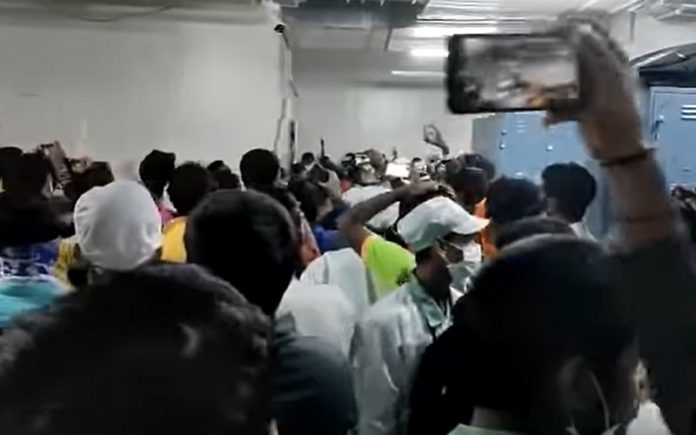
CHENNAI: The ransacking of an iPhone manufacturer in southern India could be the first of many “flashpoints” involving local workers in the supply chains of major brands, researchers said on Tuesday, pointing to a lack of rights and recourse under new labour laws.
Thousands of contract workers in India’s tech hub of Bengaluru gathered on Saturday outside a factory owned by Taiwanese firm Wistron Corp — a supplier for Apple Inc — to demand unpaid wages and better working hours.
As police arrived, the crowd turned violent and video from the scene showed people armed with rods and sticks smashing equipment and vandalising cars, causing up to US$7.1 million in damage according to an estimate by the company.
The All India Central Council of Trade Unions (AICCTU) said the incident in the southern state of Karnataka was a result of workers being subjected to “extremely exploitative sweatshop-like working conditions in gross violation of labour laws”.
The workers earned far less than the promised 22,000 rupees (US$299) monthly salary and were not paid wages for November, according to the AICCTU, which said government officials and the management at Wistron had not responded to their complaints.
“These workers are from very poor families and not getting their wages was pushing them to the brink,” said Clifton D Rosario, national secretary at the AICCTU.
Apple said on Monday it was sending staff and auditors to the site and was cooperating with police. Wistron said in a regulatory filing in Taiwan it “always abides by the law, and fully supports and is cooperating with relevant authorities”.
A labour department official in Karnataka, who requested anonymity as he was not authorised to speak to the media, said on Tuesday that the issue was being resolved and workers would receive their dues. The factory would re-open soon, he added.
Labour rights experts warned that worker unrest in Indian manufacturing hubs could increase as new laws, which were passed in September, deny labourers the right to strike or receive social benefits if they are working for smaller companies.
“These flashpoints will continue,” said P K Anand, a visiting researcher at the Delhi-based Institute of Chinese Studies, who works on labour issues in China and India.
“It is the only way for workers to be heard in the absence of legal safeguards and proper grievance redress mechanisms,” Anand told the Thomson Reuters Foundation by telephone.
Further violence feared
Wistron has been making iPhones in India for nearly four years and its operation has been seen as a success story for Prime Minister Narendra Modi’s government that is looking to boost manufacturing under its “Make in India” slogan.
Several major tech brands including South Korea’s Samsung Electronics Co and China’s Xiaomi Corp have outsourced production to or set up factories in India in recent years.
Wistron’s Narasapura factory in Bengaluru employs about 1,300 permanent workers and at least 8,000 contract workers who were hired through various contractors, the AICCTU said.
Police said on Monday they had arrested 149 people over the violence, and were looking to find and arrest more perpetrators.
Rosario of the AICCTU said many of the other workers were “petrified” and had switched off their phones to avoid contact.
While the government has said the new labour legislation — aimed at streamlining complex regulations — would protect workers, six states have this year relaxed or suspended labour laws to help the industry recover from the coronavirus pandemic.
The changes mean workers could face longer days and lower pay, and risk fuelling more protests, according to researchers.
“This (Wistron incident) should purely be seen as a case of wage theft,” said Rajesh Joseph, a professor teaching labour issues at the Azim Premji University in Bengaluru.
“There was no union to negotiate on behalf of the workers, inspections are non-existent and there is no mechanism for anonymous complaints. So where should a worker complain? If they have nowhere to go, you will see more violence.”


